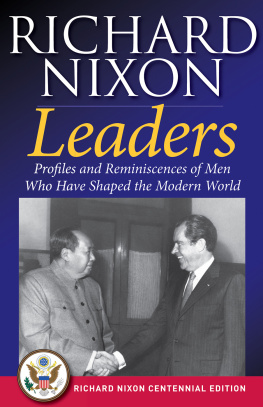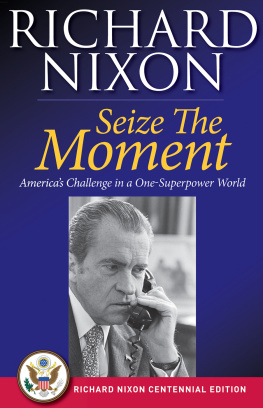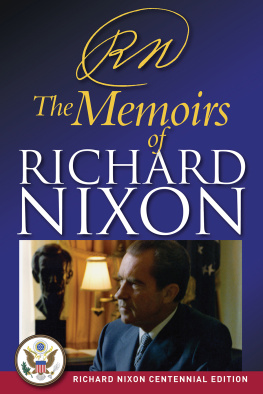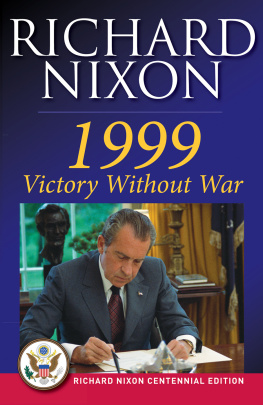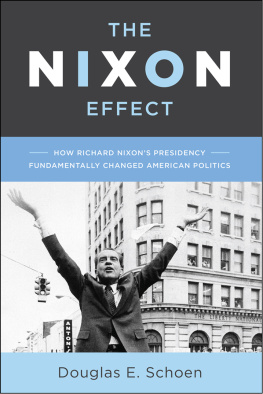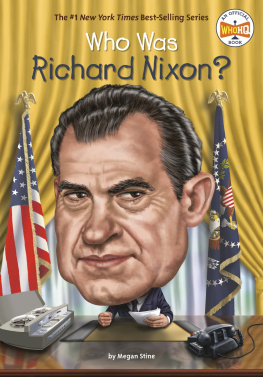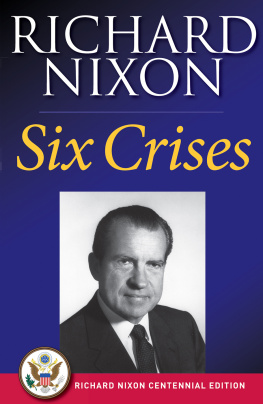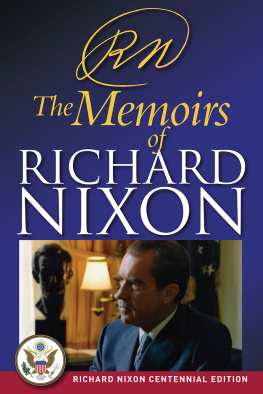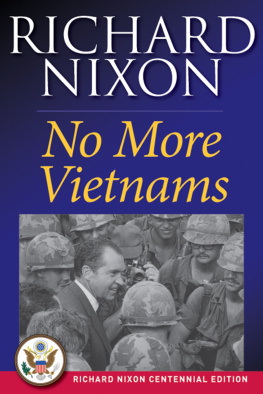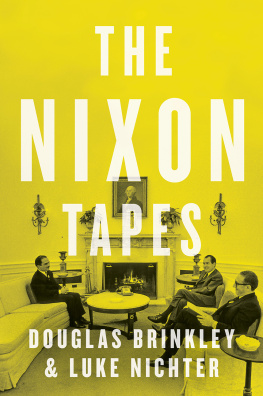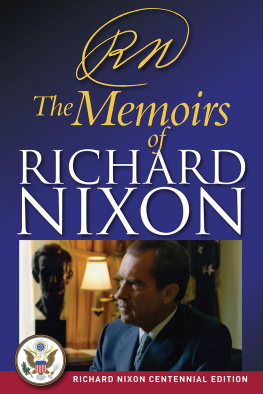
Also by Richard Nixon
Beyond Peace
Seize the Moment
In the Arena
1999: Victory Without War
No More Vietnams
Real Peace
The Real War
RN: The Memoirs of Richard Nixon
Six Crises
We hope you enjoyed reading this Simon & Schuster eBook.
Join our mailing list and get updates on new releases, deals, bonus content and other great books from Simon & Schuster.
C LICK H ERE T O S IGN U P
or visit us online to sign up at
eBookNews.SimonandSchuster.com
Thank you for purchasing this Simon & Schuster eBook.
Join our mailing list and get updates on new releases, deals, bonus content and other great books from Simon & Schuster.
C LICK H ERE T O S IGN U P
or visit us online to sign up at
eBookNews.SimonandSchuster.com
CONTENTS

To the leaders of the future
INTRODUCTION

My third book, The Real War, dwelled on tangible factors in geopolitics such as military power and economic power. But it was also about the less-tangible but far greater power of the human spirit. As Sir Robert Thompson once remarked, national power equals applied resources plus manpower times willand a nation draws its will principally from the example of its leaders. During the late 1970s, the United States lacked effective leadership and therefore lacked national will and purpose. So it was logical that my study of the quagmire of indecision and self-doubt into which Americas vacuum of leadership had plunged it in the late 1970s should lead to a study of leadership itselfhence my next book, Leaders.
Of all the books I have written, Leaders is probably my favorite. Its model was Churchills Great Contemporaries, which I read for the first time in 1979. Churchills work was assembled from a series of profiles he had written while languishing in the political wilderness before World War II. He had written some of the pieces because he needed the money. As a result of the success of my memoir RN, published in 1978, my financial situation was no longer as bad as his had been, but my political situation was, if anything, worse. Unlike him, I had no thought of returning to public life. I had found that writing was the best way to keep my mind active and sharp, since it is the only kind of work that requires the same degree of concentration as decision-making.
To help plan the project I again called upon Ray Price, who had headed the speech writing office in the Nixon White House and also provided invaluable editorial assistance on The Real War. He enlisted a cadre of bright undergraduates to prepare monographs, reading lists, and other research tools for me while I was still working on the final draft of The Real War. Once Mrs. Nixon and I had moved back to New York and I was able to turn my full attention to the project, the most difficult problem was deciding which leaders to include from among those I had met while traveling to over eighty countries over a period thirty-three years.
To qualify, the leaders had to meet two tests. I had to have known themwhich did not eliminate many, since I had known every major postwar leader except Stalin. They also had to have made a differenceby building their nation, by saving it, or by moving the world in some other singular way. I had been fascinated by Toynbees concept of withdrawal and return, and there was no question that the book would include profiles of leaders who had spent time in the wildernessnot only Churchill but also de Gaulle, Adenauer, and Alcide de Gasperi of Italy. Each had returned from the wilderness to lead his nation out of a moment of supreme crisis.
My first list also contained a select group of great Americans such as Dwight Eisenhower, Bob Taft, and Richard Russell. In the end the only American who made it was Douglas MacArthur, and only then because his greatest contribution was as the architect, along with Shigeru Yoshida, of modern Japan. Mark Hatfield, who was one of my closest friends in the Senate when I served as President, and who remains one of my most loyal readers, once asked me why I ultimately chose not to write about other Americans. One reason was simply a shortage of space. But as the book took shape, it became clear I was writing not only about the makings of leadership but about the makers of the post-World War II worldfrom the great power centers of the Soviet Union, China, Japan, and Western Europe to the post-colonial Third World and the red-hot cauldron of the Middle East. When I write I always hope to reach younger Americans, and while most students have at least an instinctual understanding of the forces that shaped their own country, polls showed that they were increasingly ill informed about the forces and personalities that had shaped the rest of the world. So I decided to leave American leaders to a future volume.
What else set these leaders apart? Just this: While I never researched the point, I would be willing to bet that none of the twenty-two leaders who receive detailed attention in the book ever commissioned a public opinion poll. Today, leaders are often judged by their ability to gauge the national mood or by their instincts for avoiding no-win issues. Most of the individuals profiled in Leaders stood out because of their ability to change the national mood or to take an unpopular issue and make it popular. As believers in democracy we are used to thinking that leaders are supposed to follow the national will. But even in a democracy, a great leader is one who forges a national purpose in the face of great crises or challenges.
Who among todays leaders would qualify for Leaders if I were writing it in 1990? Certainly Margaret Thatcher would deserve consideration for dragging Great Britain away from the abyss of irrelevancy and stagnation to which it had been brought by a generation of socialism. Mikhail Gorbachev would also be a finalist for recognizing that the dead hand of communism was turning the Soviet Union into a second-rate power. But with the exception of Lee Kuan Yew of Singapore, one of the greatest nation-builders of the century, I chose not to include living leaders in the book, and I would not want to diminish Lees special place in it by making more exceptions.
In the end, the only leader I would add today would be the late President Zia ul-Haq of Pakistan, with whom I met on several occasions both in New York and during a visit to Islamabad and Peshawar in 1985. During the critical stages of the war in Afghanistan, in spite of Soviet intimidation and growing domestic unrest, he provided a haven for the Afghan resistance and for three million refugees who had been driven from their homes by the war. If it had not been for his courageous policies, the Soviets might never have withdrawn their forces. As much as any other leader of recent times, Zia truly made a difference.
RN
March 1, 1990
Saddle River, New Jersey
THEY MADE
A DIFFERENCE

Leaders Who Changed the World
I N THE FOOTSTEPS of great leaders, we hear the rolling thunder of history. Throughout the centuriesfrom the ancient Greeks, through Shakespeare, to the present dayfew subjects have proved more perennially fascinating to dramatists and historians alike than the character of great leaders. What sets them apart? What accounts for that particular, indefinable electricity that exists between the leader and the led?
Next page
